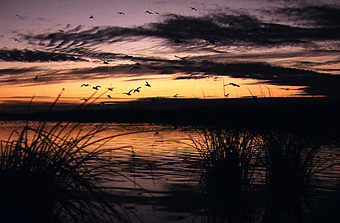
|
 |
 |
 Editorials | Environmental | February 2008 Editorials | Environmental | February 2008  
Mexico Adds Wetlands to World Registry as Environmentalists Warn Against Development
 Istra Pacheco - Associated Press Istra Pacheco - Associated Press
go to original


| | Development has threatened Mexico's coastal wetlands and mangrove forests since the late 1960s, when construction took off in the Caribbean resort town of Cancun, an area of coral reefs and fragile lagoons. | | |
Mazatlan, Mexico – Mexico has added 45 wetlands to an international registry that promotes conservation and sustainable development, even as environmentalists warn wetlands remain poorly protected in Mexico.

Environment Secretary Juan Elvira Quesada said Saturday the 6.7 million acres of newly protected wetlands dot Mexico's Caribbean coast, the Baja California Bay of San Quintin and southernmost state of Chiapas. They raise the total area of protected wetlands to 19.8 million acres.

The additional areas bring Mexico's wetlands inventory to 112 sites, second only to the U.K. under the 1971 international Convention on Wetlands, officials said.

Development has threatened Mexico's coastal wetlands and mangrove forests since the late 1960s, when construction took off in the Caribbean resort town of Cancun, an area of coral reefs and fragile lagoons.

As large luxury hotels spread south along the coast of Quintana Roo state, environmentalists have repeatedly warned of the impact of tourism. Inland waterways and swaths of the Pacific coast face similar pressures.

Greenpeace blames the government, citing a bill now before Congress that would let developers raze mangrove swamps in return for a tax and promise to replace the destroyed trees.

“The mangroves are part of a complicated ecosystem,” said Raul Estrada, a spokesman for Greenpeace in Mexico, who called it “science fiction to say you can transplant mangroves.”

“There can be a lot of protected areas, but as long as the environmental policies of the Mexican government don't change and they don't respect the zones, nothing is going to change,” he said.

Mangrove forests buffer coastal communities from hurricanes and are prime habitat for migratory birds and aquatic life. | 
 | |
 |



